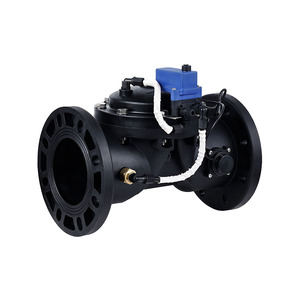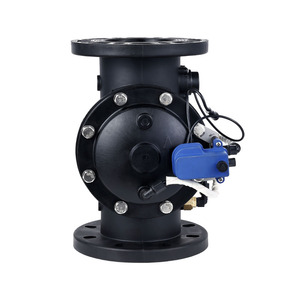
All categories
Featured selections
Trade Assurance
Buyer Central
Help Center
Get the app
Become a supplier

(545 products available)




















































There are several types of underground water shut-off valves. Each type is designed to serve different purposes and has unique functional characteristics.
These include:
Gate Valves
Gate valves operate with a wedge-shaped metal gate that moves up or down to open or close the valve. Water can either freely flow through the valve when it is open, or it can completely shut off when the valve is closed. Gate valves are ideal for situations that require a complete shut-off or no shut-off since they tend to offer little or no resistance to flowing water when open.
Ball Valves
A ball valve's characteristic feature is a solid ball with a hole in the center for the passage of water. This ball is mounted within the valve structure and is rotated a quarter turn to either allow or stop water flow. Since their construction enables wide-open or complete closed positions, ball valves provide an excellent seal, making them very suitable for underground shut-off needs.
Check Valves
Also known as backflow prevention valves, these valves are designed to only allow water to flow in one direction, hence preventing backflow. They are very important in irrigation and other water distribution systems where cross-contamination between two water supply systems is dangerous. Check valves stop water from flowing backward and ensure that the system pressure is appropriately maintained.
Globe Valves
Unlike gate valves, globe valves are good for both flow regulation and shut-off because their internal parts enable them to partially open and close to give different flow rates. They are fairly efficient at sealing off water flow. With the understanding that these valves are not generally employed for shut-off purposes, it is worth mentioning that they can also provide shut-off capabilities when working with underground systems.
Stop Cock
A stop cock is a type of valve used to stop the flow of water. A stop cock is generally used at the point where the main water supply enters a building and is usually located underground. It allows users to turn off the water supply to a building when required.
For buyers that need these valves in large quantities, the material and durability of underground water shut-off valves are therefore very important to directly impact what they would eventually be and how much they would cost. Subsurface conditions, soil type, and water composition must all be considered when choosing valve materials since they will affect the durability of these underground valves.
Corrosion-Resistant Materials
It is pertinent that shut-off valves designed for underground use be made of sturdier materials that are resistant to corrosion. Since they’re often exposed to moist soils that promote rusting, metals that resist this would include brass, bronze, and stainless steel. Both brass and bronze are favored to provide a combination of strength, resistance to corrosion, and affordability, especially for marine and general applications.
Polymeric Materials
Polymer plastics like PVC, CPVC, and PEX are themselves used for underground shut-off valves due to their resistance to chemical effects and electrical corrosion. They also have the added advantage of being lighter and easier to install. These materials have water acidity and are great for use in irrigation systems or areas that have high soil acidity.
Steel with Protective Coatings
In situations that require steel to be used due to its high strength and pressure-resistance properties, it usually has protective coatings, galvanization, or fusion-bonded epoxy to enhance its corrosion resistance. This is especially so in tough soils that tend to wear away materials such as galvanized steel coats or other protective coatings.
Durability Features
In addition to being made of stronger and more resilient materials, shut-off valves intended for use in sub-surface conditions are also fitted with specific durable features. Examples of these include:
Residential Water Supply Control
A residential underground shut-off valve is used to control the flow of water from the main supply line to the house. Stopping or starting the water supply to the house can be beneficial during water-line repairs, removing a house's need for water supply, or doing general house repairs. This will be a stop cock valve located beneath the owner's control for use at home.
Commercial and Industrial Applications
Shut-off valves control the underground water supply in commercial spaces, where the water will be required for sanitation, cooling systems, and landscaping. This ball valve is embedded in the soil and is used to shut off the water supply when there are repairs or when the water pressure needs to be adjusted. Pipe Gears, Nipples, and unions are parts needed to install a commercial or industrial shut-off valve properly.
Agricultural Irrigation Systems
Irrigation in agriculture commonly utilizes underground shut-off valves for regulation and control of water supply to crop fields. There is usually a controlling valve here, which would be a check valve to prevent backflow and maintain desired water pressure to irrigation systems. Check valves assist in ensuring there is one-way flow to baskets to avoid wastage and promote efficiency in farming.
Municipal Water Distribution Systems
There's a great need for underground shut-off valves in large-scale municipal water supply systems. These gate or globe valves control the flow of water through main pipelines and distribution networks. They are commonly used when maintenance operations require repair of the pipeline infrastructure or the need to isolate a section for operational reasons. This will prevent residents from being affected by the closure of the pipelines.
Fire Safety Systems
Fire hydrants are connected to the underground water supply network to be available for fire emergencies. A fire hydrant valve will be connected to the irrigation piping buried in the ground and open to provide fire trucks with water supply upon request. It's very important to have high-quality shut-off valves for proper maintenance and regulation of fire hydrants.
Soil and Environmental Conditions
One of the main considerations when selecting an underground water shut-off valve is the type of soil and environment it will be installed in. The kind of soil significantly influences the type of materials that have to be used for valve construction due to the possibility of soil corrosion. The best choice for extremely corrosive soil, such as clay, would be stainless steel, brass, or a valve made from a corrosion-resistant polymeric material.
Water Quality and Pressure
Water quality relates to the pH or other chemical contents that could affect the underground water shut-off valve over a period. For example, underground waters with high acidity or chemical content require materials like CPVC. That is because it is resistant to acidic water. The shut-off valve will also need to be pressure-rated appropriately to avoid failing due to high or low water pressure.
Valve Type and Functionality
This has to do more with the intended use of the shut-off valve. For example, a residential Stop cock valve will be used to turn off the water supply to individual houses. In contrast, agricultural irrigation uses a check valve to avoid water wastage through backflow. Then, the underground shut-off valve for the end users will be functional and practical.
Durability and Maintenance
Durability is always very important when it comes to buying valves intended for buried applications, as they are not particularly easy to access. The materials used should be sturdy enough to resist corrosion and weathering. Valves like ball valves and gate valves are very durable and require little or no maintenance at all.
Size and Installation
The shut-off valve size must be compatible with the existing pipeline system to ensure smooth, undisrupted water flow. Any size, whether small or large, must be fitting. As for installation, while some valves come with additional installation features that make them easy to install, several others are not so convenient and may take up a lot of time and require extra work.
A: This is the valve that controls the water supply to the entire house and is found buried in the ground. It's a Stop Cock valve that is used to turn off the water supply to the house when there are repairs or renovations.
A: Its main function is to stop or allow the main water supply to a building/house. There are many other situations where an underground shut-off valve may be useful.
A: The suitable or ideal type depends on the dwelling's pipeline system and the soil type it is facing daily. For example, materials like brass, stainless steel, and polyvinyl chloride are the most suitable for corrosive soil types and water conditions with high chemical content.
A: Not really. As the name implies, the lubricated valves need to be lubricated to ensure their proper functioning, and they also need regular maintenance. There is no need to lubricate non-lubricated valves. They are easier to maintain than lubricated ones.
A: With the right valve material and good soil type, it would last for a decade or two. However, environments with corrosive soil types may require more frequent replacements.